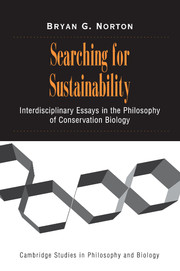Book contents
- Frontmatter
- Contents
- Searching for Sustainability
- General Introduction: An Interdisciplinary Experiment
- I PRAGMATISM AS AN ENVIRONMENTAL PHILOSOPHY
- II SCIENCE, POLICY, AND POLICY SCIENCE
- III ECONOMICS AND ENVIRONMENTAL SUSTAINABILITY
- IV SCALING SUSTAINABILITY: ECOLOGY AS IF HUMANS MATTERED
- V SOME ELEMENTS OF A PHILOSOPHY OF SUSTAINABLE LIVING
- VI VALUING SUSTAINABILITY: TOWARD A MORE COMPREHENSIVE APPROACH TO ENVIRONMENTAL EVALUATION
- Index
III - ECONOMICS AND ENVIRONMENTAL SUSTAINABILITY
Published online by Cambridge University Press: 21 January 2010
- Frontmatter
- Contents
- Searching for Sustainability
- General Introduction: An Interdisciplinary Experiment
- I PRAGMATISM AS AN ENVIRONMENTAL PHILOSOPHY
- II SCIENCE, POLICY, AND POLICY SCIENCE
- III ECONOMICS AND ENVIRONMENTAL SUSTAINABILITY
- IV SCALING SUSTAINABILITY: ECOLOGY AS IF HUMANS MATTERED
- V SOME ELEMENTS OF A PHILOSOPHY OF SUSTAINABLE LIVING
- VI VALUING SUSTAINABILITY: TOWARD A MORE COMPREHENSIVE APPROACH TO ENVIRONMENTAL EVALUATION
- Index
Summary
My home field, environmental ethics, considers itself at war with economists – or at least with economists' ideas. Economics, you see, is unapologetically an anthropocentric scientific endeavor. If one observes the field of environmental economics from the viewpoint of a committed nonanthropocentrist – and the majority of environmental ethicists have committed themselves to some form of nonanthropocentrism – there is only one appropriate response to environmental economists and their models. Since all economic value is measured in units of human welfare, economists became the favorite targets of philosophers, who attacked them for dogmatically assuming an answer to the central question of environmental ethics. For someone like me, however, who doubts the importance of the anthropocentrism–nonanthropocentrism debate, it was possible to raise more nuanced questions about the philosophy of environmental economics and its contribution to understanding sustainability.
First, it seemed important to acknowledge that economics – which, after all, has the advantage of being able to quantify human values – is especially helpful in characterizing the ways in which people resolve important trade-offs. By representing environmental goods as consumer goods in competition with other opportunities to consume or invest, environmental economists provide one set of tools for examining the trade-offs between environmental protection and other social goods. In “Sustainability, Human Welfare, and Ecosystem Health,” I first explored the possibility that different decision tools may be appropriate for different types of decisions, and that use of standard economic criteria such as cost-benefit analysis may provide a useful analysis of a wide range of private and public decisions, but that such decision processes are not appropriate for all types of decisions.
- Type
- Chapter
- Information
- Searching for SustainabilityInterdisciplinary Essays in the Philosophy of Conservation Biology, pp. 165 - 167Publisher: Cambridge University PressPrint publication year: 2002

